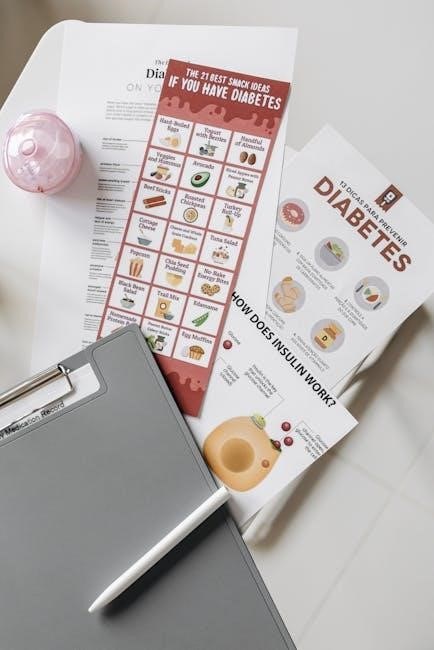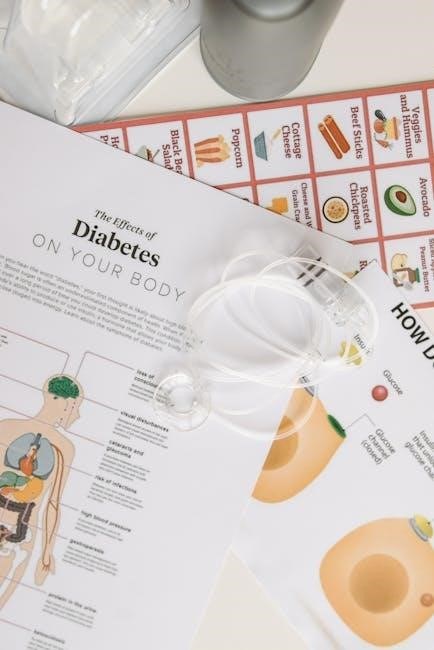Family nutrition is the foundation of overall health, empowering families to embrace balanced eating habits․ It guides informed food choices, fostering wellness and creating a healthier future for generations․
The Importance of Family Nutrition
Family nutrition is crucial for maintaining overall health and well-being․ It provides essential nutrients, energy, and supports growth and development across all ages․ A balanced diet helps prevent chronic diseases, strengthens immunity, and enhances mental clarity․ Healthy eating habits modeled by parents guide children in making wise food choices, fostering a lifetime of wellness․ Prioritizing family nutrition creates a foundation for long-term health, reducing the risk of diet-related illnesses and promoting a vibrant, active lifestyle for generations․
Benefits of Healthy Eating for Families
Healthy eating fosters strong immune systems, boosts energy, and supports mental clarity․ It reduces the risk of chronic diseases, such as diabetes and heart conditions, while promoting healthy growth in children․ Balanced meals enhance family well-being, creating a foundation for long-term health․ Encouraging nutritious habits early helps children develop lifelong healthy eating patterns, benefiting the entire family and future generations․ Practical tips like involving kids in meal prep can make healthy eating enjoyable and sustainable․
The Role of Parents in Guiding Family Nutrition
Parents play a vital role in shaping healthy eating habits by leading by example and creating a supportive environment․ They guide food choices, plan balanced meals, and encourage mindful eating․ By involving kids in grocery shopping and meal prep, parents foster curiosity and responsibility․ Their influence helps build lifelong nutrition habits, ensuring a healthier future for the entire family while addressing age-specific needs and preferences effectively․
Meal Planning and Preparation
Meal planning and preparation are essential for maintaining a balanced diet․ Organize weekly meals, involve all family members, and ensure each meal is nutritious and stress-free․
Creating a Balanced Family Nutrition Plan
A balanced family nutrition plan ensures variety and nutrient-rich meals․ Divide plates into half non-starchy vegetables, one-fourth protein, and one-fourth whole grains․ Encourage hydration and limit processed foods․ Involve kids in grocery shopping to foster healthy choices․ Plan meals weekly to avoid stress and ensure everyone’s needs are met․ Tailor portions to individual needs and preferences for a harmonious, nutritious family diet․
Age-Specific Dietary Needs for Family Members
Toddlers need nutrient-rich foods for growth, like fruits, vegetables, and whole grains․ Teenagers require more protein and calcium for development․ Adults should focus on balanced diets for energy and health․ Seniors benefit from fiber-rich foods and vitamins for digestion and longevity․ Tailoring meals to these needs ensures everyone’s nutritional requirements are met, promoting overall family well-being and vitality across all life stages․
Budget-Friendly Tips for Healthy Family Meals
Plan meals and create a grocery list to avoid waste․ Buy seasonal produce and staples in bulk for savings․ Use coupons and shop for affordable proteins like beans or eggs․ Repurpose leftovers creatively to reduce waste․ Opt for whole grains and versatile ingredients that stretch across multiple meals․ Healthy, nutritious meals don’t have to be costly with smart planning and resourceful shopping strategies․

Encouraging Healthy Eating Habits
Model healthy behaviors, involve kids in grocery shopping, and make mealtime enjoyable․ Offer variety, encourage experimentation, and celebrate small steps toward balanced eating to foster lifelong habits․
Strategies to Overcome Picky Eating in Children
Encourage children to explore new foods by involving them in grocery shopping and meal prep․ Offer small portions of novel foods alongside favorites․ Make mealtime fun and stress-free, avoiding pressure to finish everything․ Model healthy eating habits and celebrate progress, no matter how small․ Rotate ingredients creatively and vary presentation to spark curiosity․ Positive reinforcement and patience are key to fostering adventurous eaters over time․
Engaging Kids in Grocery Shopping and Meal Prep
Involve children in grocery shopping by letting them pick new fruits or vegetables to try․ Encourage them to help with meal planning and preparation, teaching them about nutrition and cooking basics․ Assign age-appropriate tasks, like washing veggies or mixing ingredients, to foster a sense of ownership․ Make it fun by creating simple, kid-friendly recipes and discussing where food comes from․ This hands-on learning promotes healthy eating and lifelong skills․
Leading by Example: Modeling Healthy Habits
Parents play a vital role in shaping their children’s eating habits by modeling healthy behaviors․ Consistently making nutritious choices and expressing enthusiasm for wholesome foods encourages kids to adopt similar practices․ Create a positive environment by enjoying meals together and avoiding unhealthy options․ Demonstrating patience and persistence helps children develop a lifelong appreciation for balanced eating, fostering a healthier family culture․

Nutritious Snacking and Portion Control
Nutritious snacking and portion control are essential for maintaining balanced nutrition․ Choose nutrient-dense snacks and practice mindful eating to avoid overconsumption, fostering healthier habits for the family․
Healthy Snack Options for Families
Healthy snacks are crucial for maintaining energy levels and overall nutrition․ Opt for nutrient-dense options like fruits, nuts, and veggie sticks with hummus․ Incorporate whole grains, such as whole-grain crackers or brown rice cakes, for sustained energy․ Encourage kids to participate in snack prep, fostering excitement for healthy choices․ Portable snacks like yogurt, hard-boiled eggs, or trail mix are great for busy families․ Always prioritize variety to ensure a broad range of vitamins and minerals․
Proper Portion Sizes for Balanced Nutrition
Portion control is vital for maintaining balanced nutrition․ Divide your plate: half with non-starchy vegetables, a quarter with protein, and a quarter with whole grains or starches․ Use measuring cups or a food scale to gauge accurate portions․ Teach children to recognize hunger cues and stop when full․ Mindful eating and avoiding distractions during meals can help prevent overeating․ Gradually adjust portion sizes to align with individual needs and promote long-term health․
Cultural and Indigenous Foods in Family Nutrition
Cultural and indigenous foods enrich family nutrition by providing essential nutrients and fostering cultural pride․ Incorporating traditional dishes enhances diversity, ensuring balanced meals while preserving heritage and promoting health․
Nutritional Benefits of Indigenous Foods
Indigenous foods are rich in essential nutrients, offering proteins, fats, vitamins, and minerals․ They provide dietary fiber, reducing chronic disease risks like diabetes and heart issues․ These foods are culturally significant, ensuring balanced nutrition and promoting overall family health through natural, wholesome ingredients․
Incorporating Traditional Foods into Modern Diets
Traditional foods enrich modern diets with cultural heritage and nutrients․ By blending indigenous ingredients into contemporary recipes, families can enjoy balanced meals that honor their roots․ This approach supports diversity in nutrition while maintaining familiarity, ensuring healthier, flavorful options for all ages․

Stay Hydrated: The Role of Fluids in Nutrition
Hydration is vital for digestion, energy, and overall health․ Aim for at least 8 cups of water daily, and limit sugary drinks to maintain optimal fluid balance․
Importance of Hydration for Family Health
Hydration is essential for maintaining physical functions, energy levels, and cognitive performance․ Water supports digestion, regulates body temperature, and transports nutrients․ Even mild dehydration can lead to fatigue and decreased focus․ Encouraging regular water intake helps prevent chronic diseases and promotes overall well-being․ Aim for at least 8 cups daily and limit sugary drinks․ Proper hydration fosters a healthier, more energetic family, making it a simple yet vital habit for daily life․
Encouraging Water and Healthy Fluid Intake
Encouraging water and healthy fluids is crucial for family well-being․ Make water easily accessible and add slices of fruits for flavor․ Limit sugary drinks and offer herbal teas or low-sugar juices․ Involve kids in refilling water bottles, creating a fun routine․ Setting a daily goal and monitoring intake can foster healthy habits, ensuring everyone stays hydrated and energized throughout the day for optimal health and vitality․

Mindful Eating and Family Mealtime
Mindful eating fosters a positive relationship with food, reducing stress and promoting a balanced lifestyle․ It encourages families to savor meals together, creating lasting memories and a healthier mindset․
Reducing Family Stress Through Mindful Eating
Mindful eating helps reduce family stress by fostering a calm, enjoyable mealtime environment․ Planning meals, involving kids in grocery shopping, and portioning plates properly can minimize chaos․ Encouraging hydration and leading by example promotes positivity․ Making healthy choices together strengthens bonds and reduces tension, creating a peaceful atmosphere for shared meals and lasting well-being․
Creating Positive Family Mealtime Experiences
Family mealtime is a chance to connect and strengthen bonds․ Make it enjoyable by involving kids in meal prep and grocery shopping, fostering excitement for new foods․ Encourage open conversations and laughter to create a warm atmosphere․ Leading by example and prioritizing quality time together helps build lasting, positive memories and a healthier relationship with food and each other․

Exercise and Physical Activity
Regular physical activity complements balanced nutrition, enhancing energy levels and overall health․ It supports better nutrient absorption and promotes a healthy lifestyle for the entire family to follow․
Link Between Nutrition and Physical Activity
Proper nutrition and regular physical activity are closely interconnected, each supporting the other for optimal health․ A balanced diet provides the essential nutrients needed to fuel exercises, enhancing performance and recovery․ Similarly, physical activity improves the body’s ability to utilize nutrients efficiently․ Together, they promote energy levels, overall well-being, and long-term health benefits for the entire family, encouraging a healthier lifestyle․
Family-Friendly Exercise Ideas for Better Health
Engaging in family-friendly exercises fosters bonding and promotes physical well-being․ Activities like walking, cycling, or swimming are great for all ages․ Indoor games such as hide-and-seek or yoga sessions can be fun alternatives․ Outdoor adventures, like hiking or playing sports, encourage exploration and teamwork․ These activities not only improve fitness but also create lasting memories, making healthy living an enjoyable family tradition․

Common Nutritional Mistakes to Avoid
Overlooking hydration, relying on processed foods, and skipping balanced meals are common errors․ Avoiding these pitfalls ensures better health and sustainable nutrition for families․
Overcoming Challenges in Family Nutrition
Planning meals, involving kids in grocery shopping, and leading by example are key strategies․ Budget-friendly tips like bulk shopping and avoiding processed foods promote healthier choices․ Consistency and patience help families adapt to new habits, fostering a culture of wellness and making nutrition a shared, enjoyable effort for all members․
Avoiding Unhealthy Food Choices
Focus on whole, nutrient-rich foods like fruits, vegetables, and whole grains․ Limit processed snacks and sugary drinks․ Encourage mindful eating and set a positive example by avoiding unhealthy options yourself․ Teach children to read labels and make informed choices․ Gradual changes, like swapping unhealthy snacks for cleaner alternatives, can lead to lasting improvements in family nutrition and overall well-being․
Family nutrition is a lifelong journey, fostering health and well-being․ By making informed choices and leading by example, families can create lasting, positive changes for generations․
Final Tips for Improving Family Nutrition
Plan balanced meals, involve kids in grocery shopping, and encourage mindful eating․ Use budget-friendly strategies like meal prepping and seasonal ingredients․ Lead by example, stay hydrated, and incorporate physical activity for overall well-being․ Foster a positive environment during mealtimes and seek professional guidance when needed․ Small, consistent changes can lead to lasting improvements in your family’s health and nutrition journey․
Resources for Ongoing Nutrition Support
Explore reliable resources like MyPlate․gov for balanced meal ideas․ Follow blogs by registered dietitians for practical tips․ Utilize evidence-based guides for age-specific needs․ Engage with online communities and expert webinars․ Download nutrition apps for meal planning and tracking․ Consult professional nutritionists for personalized advice․ Access free videos and articles on health topics․ Leverage cultural guides for diverse food options to support your family’s nutritional journey and long-term wellness goals․